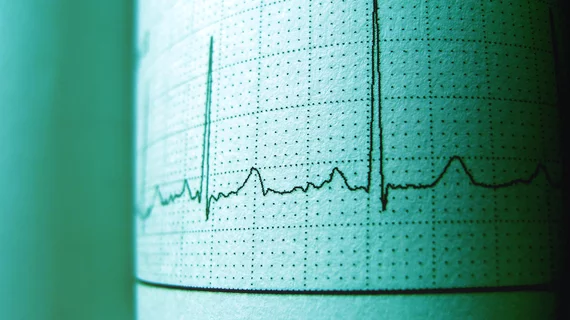Monitoring high-risk patients for AFib fails to reduce stroke risk
Continuous heart rhythm monitoring with an implantable loop recorder (ILC) leads to much higher rates of atrial fibrillation (AFib) detection, according to new findings published in The Lancet. However, researchers emphasized, monitoring did not significantly reduce a patient’s risk of stroke or cardiovascular mortality.
The LOOP study, presented virtually as part of ESC Congress 2021, included more than 6,000 high-risk patients who were randomized at a 1:3 ratio to either receive continuous ECG monitoring with an ILC or receive normal care. The ILC provided 24/7 monitoring, and patients were urged to begin anticoagulation therapy if an AFib episode lasting longer than six minutes was detected.
The patients receiving standard care, on the other hand, had telephone interviews with a nurse once every year.
The mean patient age was 74.7 years old, and 52.7% of patients were men. The median duration of ECG monitoring was more than 39 months; the median follow-up period was more than 64 months.
Overall, AFib was detected in 31.8% of patients in the ILC group and 12.2% of patients in the standard care group. While 29.7% of patients in the ILC group started anticoagulation therapy over the course of the study, that number was 13.1% for the standard care group.
The study’s endpoint was stroke or systemic arterial embolism, which occurred in 4.5% of patients in the ILC group and 5.6% of the standard care group, a difference viewed as nonsignificant by researchers.
The rates of cardiovascular death were also similar, coming in at 2.9% for the ILC group and 3.5% for the standard care group.
“In individuals with stroke risk factors, ILR screening resulted in a three-times increase in AFib detection and anticoagulation initiation but no significant reduction in the risk of stroke or systemic arterial embolism,” wrote lead author Jesper Hastrup Svendsen, MD, of Copenhagen University Hospital in Denmark, and colleagues. “These findings might imply that not all AFib is worth screening for, and not all screen-detected AFib merits anticoagulation.”
The full analysis is here.
More information related to ESC Congress 2021, a virtual conference hosted by the European Society of Cardiology, is available here.

